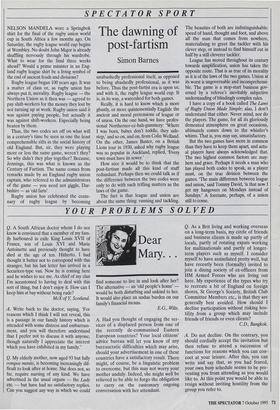SPECTATOR SPORT
The dawning of post-fartism
Simon Barnes
NELSON MANDELA wore a Springbok shirt for the final of the rugby union world cup in South Africa a few months ago. On Saturday, the rugby league world cup begins at Wembley. No doubt John Major is already shuffling nervously through his wardrobe. What to wear for the final three weeks ahead? Would a prime minister in an Eng- land rugby league shirt be a living symbol of the end of ancient feuds and divisions?
Rugby league began 100 years ago. It was a matter of class or, as rugby union has always put it, morality. Rugby league — the Northern Union as it then was — agreed to pay shift-workers for the money they lost by not turning up at work. Rugby union said it was against paying people, but actually it was against shift-workers. Especially being beaten by them.
Thus, the two codes set off on what will in a century's time be seen as one the least comprehensible rifts in the social history of old England. But, sir, they were playing more or less the same game, weren't they? So why didn't they play together? Because, Jennings, this was what is known as the Century of Fartism. The name comes from remarks made by an England rugby union captain, who referred to the administrators of the game — you need not giggle, Dar- bishire — as 'old farts'.
Rugby union has celebrated the cente- nary of rugby league by becoming unabashedly professional itself, as opposed to being abashedly professional, as it was before. Thus the post-fartist era is upon us; and with it, the rugby league world cup. It is, in its way, a watershed for both games.
Really, it is hard to know which is more ghastly, or more quintessentially English: the ancient and moral pretensions of league or of union. On the one hand, we have profes- sional Northemer-ee-bah-gummery: 'Where I was born, babes don't toddle, they side- step,' and so on, and on, from Colin Welland. On the other, James Baxter, on a British Lions tour in 1930, asked why rugby league was so popular in Auckland, replied, 'Every town must have its sewer.'
How nice it would be to think that the post-fartism made all this kind of stuff redundant. Perhaps then we could talk as if the difference between the two codes were only to do with such trifling matters as the laws of the game.
The fact is that league and union are about the same thing: running and tackling. The beauties of both are indistinguishable: speed of hand, thought and foot, and above all the man that comes from nowhere, materialising to greet the tackler with his clever step, or instead to find himself cut in half by a still cleverer tackler.
League has moved throughout its century towards simplification, union has taken the opposite route. That is as true of its morality as it is of the laws of the two games. Union at its worst is ungovernable and incomprehensi- ble. The game is a stop-start business gov- erned by a referee's inevitably subjective understanding of blindingly complex rules.
I have a copy of a book called The Laws of Rugby Union Made Simple; alas, I don't understand that either. Never mind, nor do the players. The game, for all its gloriously demented atmosphere on great occasions, ultimately comes down to the whistler's whims. That is, you may say, unsatisfactory.
But the two games have more in common than they have to keep them apart, and actu- al players have always acknowledged that. The two highest common factors are may- hem and grace. Perhaps it needs a man who has played both codes to speak, as a player must, on the true division between the games. 'The main difference between league and union,' said Tommy David, is that now I get my hangovers on Mondays instead of Sundays.' A foretaste, perhaps, of a union still to come.










































































 Previous page
Previous page